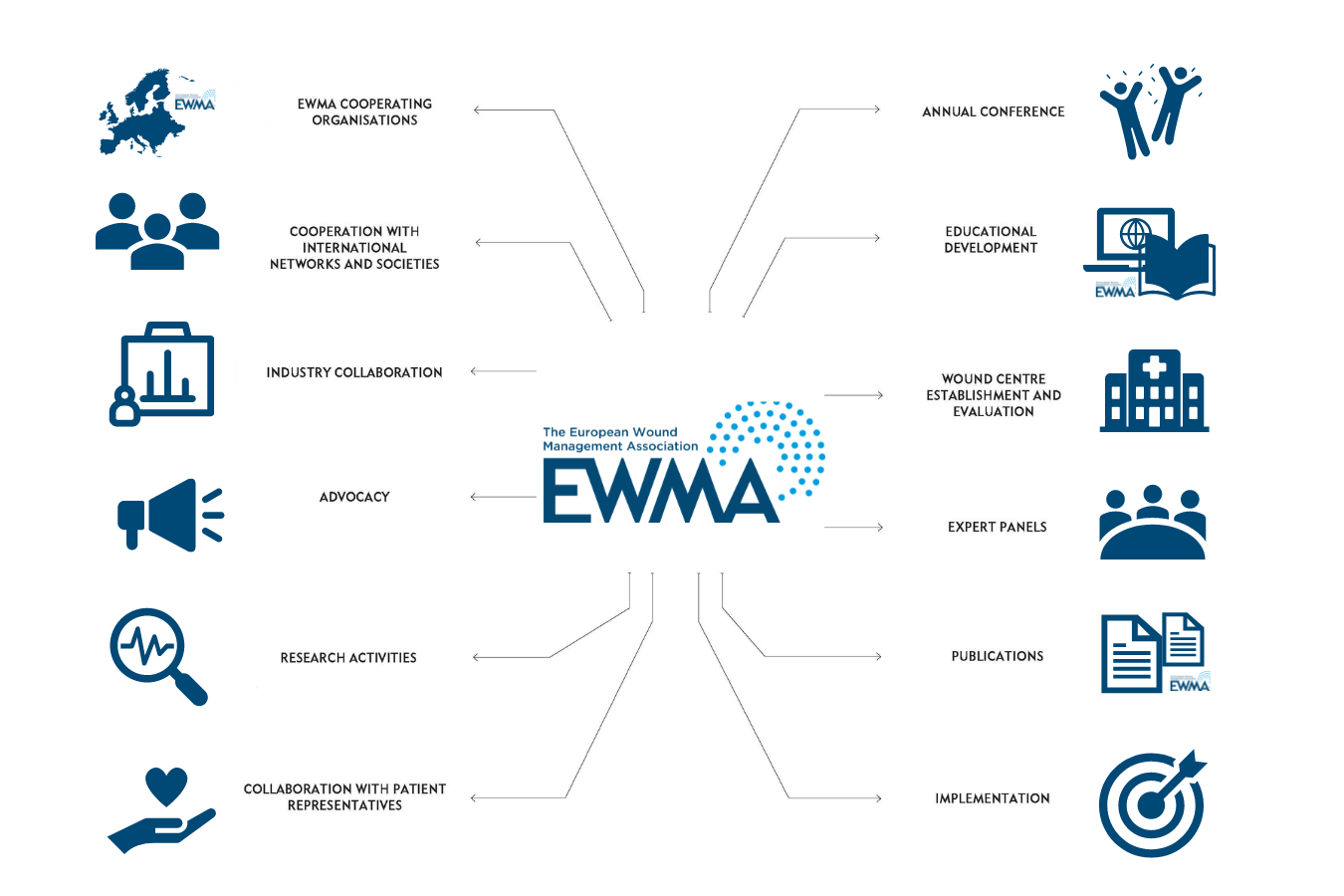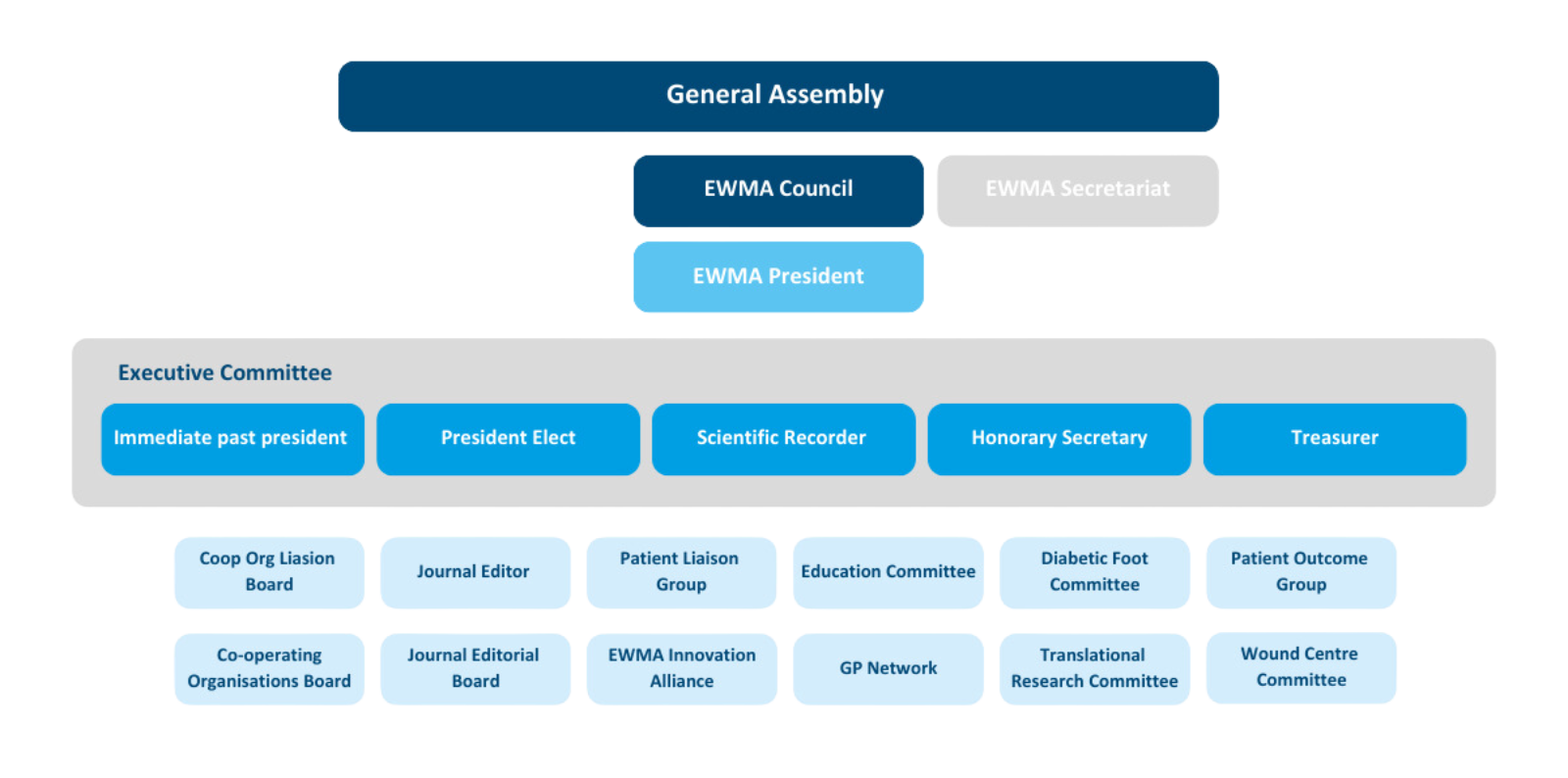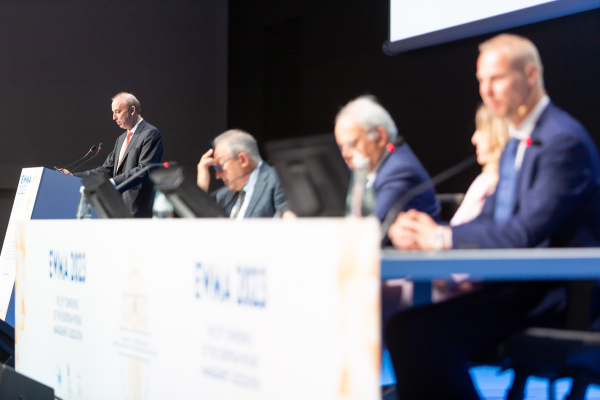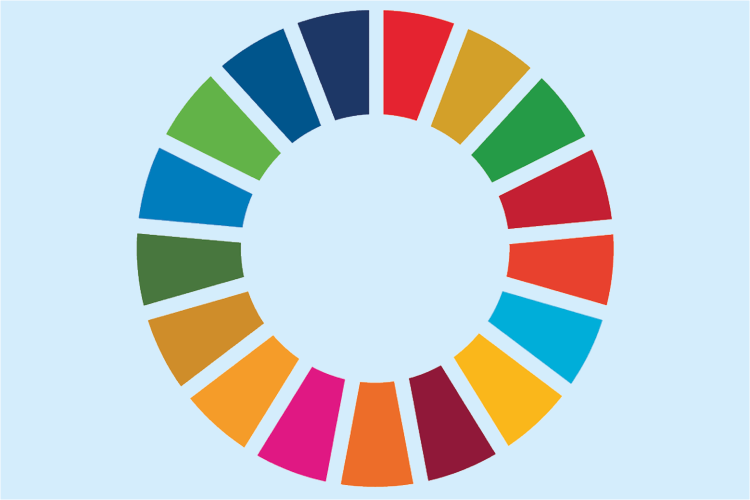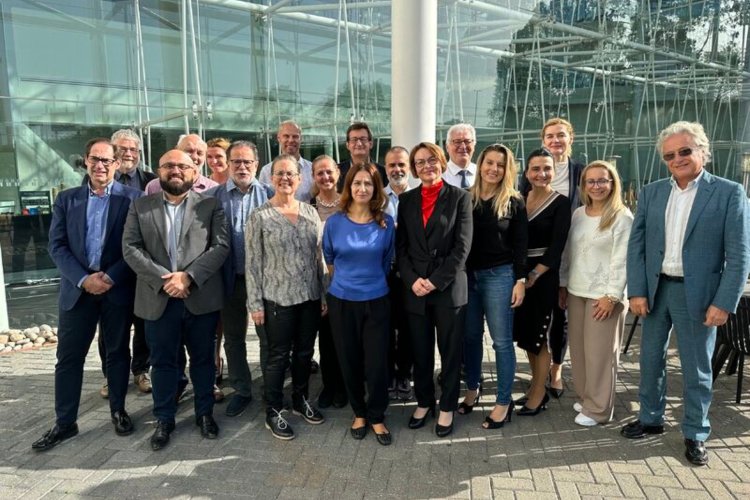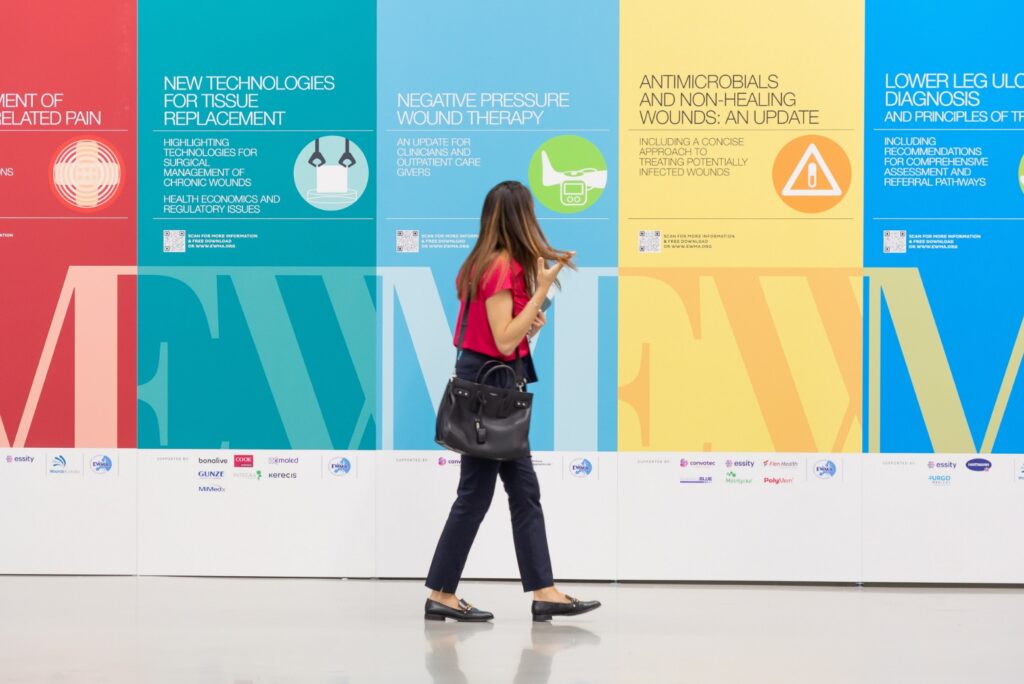Organisation
The European Wound Management Association (EWMA) is a European not-for-profit umbrella organisation, linking national wound management organisations, individuals and groups with interest in wound care.
What is EWMA?
The European Wound Management Association (EWMA) is a European not-for-profit umbrella organisation, linking national wound management organisations, individuals and groups with interest in wound care.
The association works to promote the advancement of education and research into native epidemiology, pathology, diagnosis, prevention and management of wounds of all aetiologies.
One of the founding principles was that EWMA would be inclusive across professions and countries, and so it has remained. Since the beginning, EWMA has welcomed nurses, doctors with various relevant specialities, as well as other professionals (e.g. micro-biologists and psychologists) into the EWMA Council.
What we do
EWMA works continuously to improve European wound patients’ quality of life. We pursue identifying and advocating the highest quality of treatment available and its cost effectiveness from a multidisciplinary point of view. We work to reach our objectives by being an educational resource for health care professionals working with wound care and prevention. We organise conferences, contribute to international projects related to wound management, actively support the implementation of existing knowledge and provide information on all aspects of wound management.
Thus, EWMA strives to be the organisation that citizens, patients, professionals, Governments, Health Services and educational institutes come to for advice, expertise and opinion in Europe.
EWMA statutes
EWMA Code of conduct/Respectful Workplace Policy
EWMA is dedicated to providing a safe and respectful environment for everyone. EWMA does not accept harassment, including but not limited to sexual harassment, bullying, physical intimidation, or discrimination. If you experience inappropriate behaviour in connection with EWMA meetings, courses or conferences, please contact the EWMA Secretariat (ewma@ewma.org). All reports will be taken seriously and handled confidentially.
EWMA's organisational structure
The European Wound Management Association (EWMA) is a European not-for-profit umbrella organisation, linking national wound management organisations, individuals and groups with interest in wound care. EWMA is a member-based organisation. The chart below illustrates how EWMA is organised.
Council & Executive Committee
EWMA Council
The Council is the main deciding body of EWMA. The EWMA Council Members have the key role in the process of developing and guiding the association towards the common goal of making a difference in the delivery of wound care in Europe. All members of EWMA have the opportunity to candidate for Council in the annual election.
If you are interested in how to stand for election for the EWMA Council, we encourage you to read the guidelines on how to stand for election.
Our objectives and goals
EWMA objectives and goals
To support collaboration between European wound healing associations.
To provide accessible educational resources for professionals, patients and citizens.
To promote non healing wounds as a major health care challenge as well as an economic burden for European health care systems.
To actively promote that most non healing wounds can be prevented.
To promote cost-effective, evidence-based best practice wound prevention and treatment.
To promote a multidisciplinary approach to the prevention and treatment of wounds.
To support that patients play a key role in prevention and treatment as a central member of the multidisciplinary treatment team.
How we work
We support our objectives by:
-
Publishing EWMA documents regarding epidemiology, pathology, diagnosis, prevention and management of wounds of all aetiologies.
-
Hosting multidisciplinary wound conferences and training courses in Europe.
-
Creating forums for networking and sharing experiences for individuals and organisations actively involved in wound management.
- Collaborating with national and international societies focusing on wound care or related topics.
- Organising advocacy activities targeting policymakers and key-opinion leaders in national governments and the European Union.
-
Providing recommendations for clinical practice.
EWMA President objectives
Kirsi Isoherranen President Objectives 2023-2025
Kirsi Isoherranen, MD, PhD, EWMA President:
“The reputation and the status of EWMA in the field of wound management is unquestionable and very strong thanks to the efforts of the current and earlier EWMA presidents and Council members.
There is undoubtedly also a strong benefit for EWMA from the hard-working and professional EWMA Secretariat team, and this gives us competitive advantage compared to other societies and organisations. Due to COVID and Ukraina war we are facing enormous challenges in respect with our feeling of secureness and possibilities to develop continuously, and we will surely find also in the future years economic challenges. Still EWMA stays on a strong basement, and we have all the possibilities to survive these crises even stronger. In these difficult times there is a special need for a servant leadership which I am ready to execute.
My vision of EWMA is a motivated, hard-working group of talented council members and other collaborators who all feel they are needed, heard, and have an important task to fulfil. My duty is to serve and motivate the team members by continuous discussion, motivation and mentoring as I have also been able to “grow” to my position thanks to many supportive colleagues within EWMA.
My role is naturally also to have these active and binding discussions with industrial partners.”
My focus areas for my term as EWMA president are
1. Further development of wound diagnosis pathways and cost-effective treatments across Europe
- In many European countries, patients suffering from a wound are first seen by primary care health professionals, and the patient is not assessed systematically which can lead to enormous delays, e.g., delays in referrals to multidisciplinary wound care team. One developmental procedure is the engagement of GP`s in the wound field by highlighting their role in “holistic care”. The activation would start by establishing a network for GP`s involved in wound management. Undoubtedly, this can be a slow process, but it has definitively to be started.
- This task also needs continuous digital development, of which The Wound Navigator (Digital checklist) will serve as a “first-aid” for GP engagement, and EWMA focus areas will be to develop it further and to implement it across Europe. Also, eLearning modules specifically aimed for primary care, including microlearning modules, will be included.
- EWMA will continue its active work in The Leg Ulcer diagnosis and Compression Therapy projects, which will be important parts of the diagnosis project. The deliverables will be e.g. Leg Ulcer Diagnosis document, the aforementioned Wound Navigator, E-learning modules, Compression Therapy Workshops and education materials. Across Europe we must again and again disseminate the importance of early diagnosis and starting of compression therapy, which in principle are the most important ways for cost-effective care and very important in terms of sustainability.
- This task will include also the activation of homecare and community care nurses, who have an important role in communication about the patient for the physician.
- This a fruitful area also for research, clinical projects and the engagement of industrial partners and will be firmly supported by EWMA.
2. Continuous improvement of the scientific programmes at EWMA conferences
- EWMA has improved enormously the scientific content of the congresses, and this direction will be supported further. The continuous search for new and talented speakers will support our role as a high-class congress organizer and the spectrum of the sessions will be mainly maintained but also new formats and recent trends will be introduced. Circulation of speakers will also ensure that EWMA will be promoted by new professionals in their respective countries. In addition to scientifically high-class key sessions, special attention will be paid to diverse “hands-on” and interactive sessions.
- The combination of virtual and face-to-face congresses and webinars will be carefully planned and the feedback of EWMA members will be an important aid in this. Virtual format will surely bring us new participants all over the world and should be continued along with face-to-face congresses. This is also important from the perspective of sustainability.
- In order to bring new ideas and insights for future congresses, EWMA will work closely with national wound organizations, but also medical specialty organizations (e.g. ESVS, EBA, EADV, WONCA).
- This involves also attracting physician and nurse experts from different wound types via specific projects (DFU, PU, VLU, Arterial ulcers, atypical ulcers)
- Special attention will be given also to ensure correct evidence presentation during the EWMA conference (from industry and other speakers). This will be started with the AMS project and regarding biofilm.
3. Highlighting the role of wound management as a rewarding and important health care area
- Continuous advocacy work within social media, webinars, conferences by making videos of “positive stories” of their career both within nurses and physicians
- Developing “career pathways” in wound healing both for nurses and physicians.
4. Bringing the patient into the center of the interdisciplinary team work
- EWMA will support the publishing of a “Patient right” document highlighting the patients`s right for multidisciplinary wound care and which will also serve for advocacy across Europe.
- EWMA will support the establishment of a Patient association for wound patients, and the format will be delivered to national wound care societies in order to support the establishment of national patient associations.
5. Continuous development of the educational activities of EWMA
- EWMA will work closely with the UEMS Multidiscplinary Joint Committee Wound Healing and EAFWH (European Association of Fellows in Wound Healing) in order to develop and harmonize wound education curriculum and educational activities for physicians. This includes regular international wound education courses for physicians within EAFWH and the updating of ETR`s within UEMS.
- EWMA will continue the strong education of nurses by further implementing the curriculas and educational material across Europe. This will be achieved by continuous collaboration with educational institutions, organisations and the EWMA Teacher Network. Especial attention will be paid to gaps that disallow this evolution.
- EWMA will continue to develop and update the educational platform, materials and E-learning modules and special attention will be focused on the material that aims to improve the psychological skills of the wound care professionals.
6. Collaboration with industry and other stakeholders
- EWMA would not be EWMA without the support of industry. During the next years, we continue to clarify the principles of collaboration. Integrity is very important for EWMA Executive and Council members, on the other hand, industry understandably needs some benefit from their investments. Integrative and respectful ways to continue the collaboration will be supported by continuous discussion with the industry partners and EWMA Council.
In line with the 17 UN Sustainable Development Goals (SDGs), EWMA will promote sustainability in several areas of wound care to address today’s major challenges. Sustainability in wound care encompasses several approaches and aspects.
